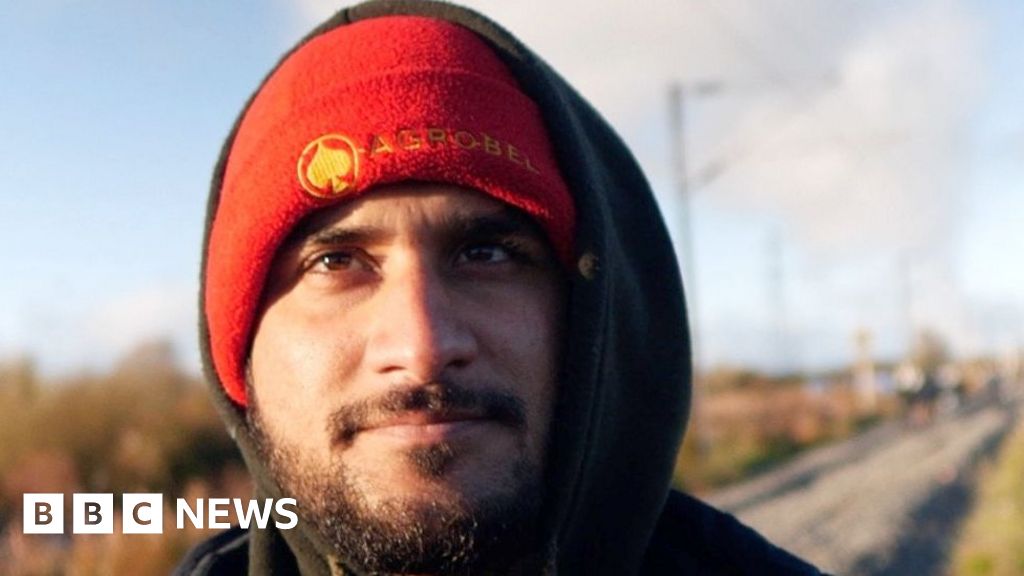- By Alex Bish & Ben Moore & Michael Keohan
- BBC South East Investigations Team
Hikmatan is one of thousands of migrants in northern France who are still determined to reach the UK
Friday marks two years since at least 27 people drowned in the deadliest migrant boat sinking in the Channel in recent years, but despite the clear dangers of attempting to reach the UK on small boats, migrants say they are still prepared to risk their lives to make the journey.
Ahead of the anniversary, just days before two others died in the Channel, BBC South East visited camps in Northern France, to speak to those who plan to make the perilous crossing from France to the Kent coast.
Hikmatan, who studied computer science in Afghanistan, said he had been waiting a month to cross.
“I have tried five times in a month, three times the boat hasn’t arrived, the fourth time the police tore down the boat, the fifth time the boat was for 55 people, we were in the boat with 86, but I didn’t have the life jacket,” he said.
The government is still hoping the threat of being sent to Rwanda will deter people from making the crossing and the immigration minister has said a new treaty with the African country is in its “final stages”.
Prime Minister Rishi Sunak said the new treaty would protect against the removal of asylum seekers from Rwanda back to their home country.
But for migrants like Hikmatan, it will not stop him from trying to cross again.
“The people don’t take any interest in these decisions, they want to cross the ocean and go to the UK. They don’t think about Rwanda,” he said.
A 12-year-old girl we spoke to at the camp said living in France was “very dangerous”
Another migrant from Iraq was not deterred by the threat of Rwanda.
“I don’t believe it,” he said, “the UK is the only choice we have. I will try boat, swimming or a truck. I have been here more than a month and I’ve been waiting and waiting.”
A 12 year-old Kurdish girl from Iraq said she was not afraid to cross by boat: “Not dangerous, I go to the UK, people in England are good, life here [in France] is very dangerous.”
A Syrian migrant said he was looking to make his first attempt to cross by boat, adding: “If we die, if anything happens, no problem. I want to live there [in the UK], I want a better life.”
The number of migrants that have reached the UK in small boats has fallen from a peak in 2022, when 45,755 made the crossing, the highest number since figures began to be collected in 2018.
As of 13 November, 27,284 people had crossed the English Channel in 2023.
Charities say poor weather has reduced the number of attempts to cross the Channel by small boat
French authorities say the figures confirm the effectiveness of the police forces and Franco-British cooperation.
But some are attempting longer Channel crossings further away from the Calais area to try to avoid police detection.
On Wednesday two people died and 57 were rescued after leaving the town of Neufchatel-Hardelot.
Flaurent Caffrey, a journalist from La Voix du Nord newspaper, said: “In Calais we now have more police, so they are trying to go from the south, but it is more and more difficult and it is more dangerous, when you are here in Boulogne it is 50km (31 miles) to cross the border.”
Florent Caffrey from La Voix du Nord says migrants are attempting to cross further south in Boulogne
Charities say heavy rain and storms have also reduced the number of attempts to cross in recent weeks.
One aid agency told the BBC 1,500 migrants are now staying in an area near Dunkirk, nearly double what it was in September, after a 30% reduction in small boat crossings compared with the same time last year.
Imogen Hardman, the operations manager for Care4Calais in northern France, said the living conditions are the worst she had ever seen.
“Over the last few weeks we have given out a total of over 1,000 waterproof pieces of clothing,” she said.
“We are seeing a huge demand for our services and our distributions because most people have been stuck here for a much longer time. The weather had made it much more difficult to cross to the UK.”
Care4Calais has seen a rise in calls for aid after a series of storms in northern France
This year the UK government said it would give France almost £500m over three years to help stop migrant boats.
Since the beginning of 2023, the French police said 272 traffickers linked to Channel crossings had been arrested, compared with 262 in 2022.
A Home Office spokesperson said: “Thanks to our work with French partners and other measures including our partnership with Rwanda, small boat crossings are down by a third.
“We have also increased the number of asylum caseworkers, leading to swifter decision making whilst continuing to deliver a range of other measures to tackle illegal migration.”

William Turner is a seasoned U.K. correspondent with a deep understanding of domestic affairs. With a passion for British politics and culture, he provides insightful analysis and comprehensive coverage of events within the United Kingdom.








